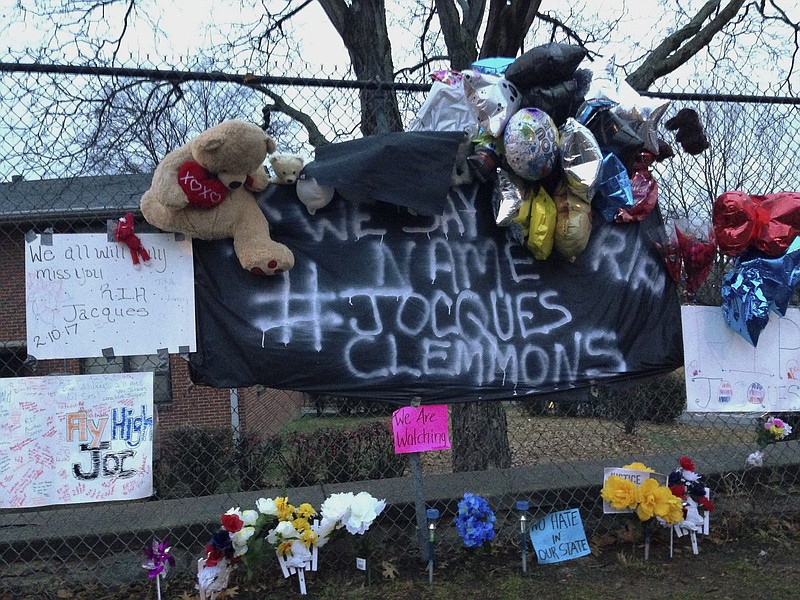NASHVILLE - Stefanie Fry had finished her lunch break at home and was getting ready to drive back to work in February when she saw two people run by in her rearview mirror.
Probably just kids playing, she thought.
When she turned around, she saw a white police officer slam a black man to the ground, yelling at the man to stop and put his hands up. The man got up, ran the other direction and appeared to stumble, landing on the pavement again. She said she saw a silver and black gun fall to the ground, perhaps from the man's hoodie or pants pocket.
The officer tried to kick the gun away, Fry told investigators, but the man grabbed the gun and ran again. Seconds later, the officer fired three gunshots.

Prosecutors leaned heavily on Fry's recollections when they decided not to charge Nashville Officer Josh Lippert for killing 31-year-old Jocques Clemmons after a traffic stop at a public housing development.
The case is different from other police shootings of black men that have come under scrutiny over the past few years because it involves a lone witness who backed up the officer's account.
Without Fry's testimony, "we would have had the officer's statement and we would have had a [surveillance] video that would not have clearly established that what was in his hand was a gun," said Nashville District Attorney General Glenn Funk. "It would've been a much different call, and might have taken even longer than this to come to a conclusion."
Lippert shot Clemmons twice in the back and once in the hip.
Clemmons' family and the NAACP are outraged. The family's attorney, Michael Hoskins, contends Fry, who police say is white, fabricated her account. They say Clemmons didn't have a gun on him.
Clemmons' fingerprint and DNA tests on the gun were inconclusive. The Tennessee Bureau of Investigation said that generally speaking it can be tough to produce usable prints and DNA from a gun.
Hoskins questioned how Fry could've witnessed the whole encounter from where she was parked. He thinks her story was so close to the police account that it was coached.
"We don't believe that the witness that they produced, Ms. Stefanie Fry, is telling the truth," Hoskins said.
Fry didn't return a telephone message for comment.
The day after prosecutors declined to file charges, "Justice for Jocques" marchers left a coffin at the front gate of Mayor Megan Barry's home with a sign that said, "You let this happen" alongside the names of Barry and Police Chief Steve Anderson.
Acting U.S. Attorney Jack Smith said federal authorities are reviewing the case.
Clemmons' death reignited conversations about whether the police can be trusted here, a swift change in a city where racial tension hasn't boiled over into riots and violence the way it has in other cities.
Prosecutors said Lippert did the right thing by picking up Clemmons' gun after shooting him because he was the only officer there, was in a neighborhood, and wasn't immediately sure how injured Clemmons was.
Lippert told investigators that once Clemmons picked up the gun and made eye contact, he had a "me or you look in his eye." Clemmons started turning toward Lippert and the barrel of the pistol was coming toward him, he said. Then he fired at Clemmons.
"I'm sorry and I feel, you know, terrible and I mourn the loss of this man," Lippert told investigators. "It's at my hands. I know that. But he was a lethal threat to me. And without a doubt, I'm telling you, if I didn't do what I did, you'd be burying me."
Officials noted there was another person who left the passenger side of the SUV that Clemmons was driving after Clemmons and Lippert began to scuffle. Funk said he tried to set up an appointment to talk to the man, but he did not show up. It's possible there is more information on the man in a Tennessee Bureau of Investigation report on the incident. A judge has said she will order that report to become public shortly.
Critics of Lippert also are calling for him to be fired, citing his disciplinary record. Lippert has been suspended 20 days over his five years as a Nashville officer.
In one case, Lippert used unnecessary physical force to take a black driver out of a car during an October 2015 traffic stop, earning him an eight-day suspension, records show.
Prosecutors said Lippert's past record didn't matter.
"Whatever Officer Lippert's prior history was, any officer faced with that situation, when someone arms themselves with a deadly weapon that can be used in the middle of a physical altercation, that officer has to assume that they're picking it up for a reason, and that is because they could hurt the officer," Funk said.
